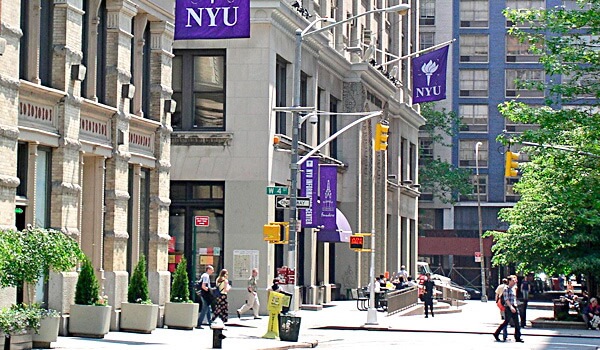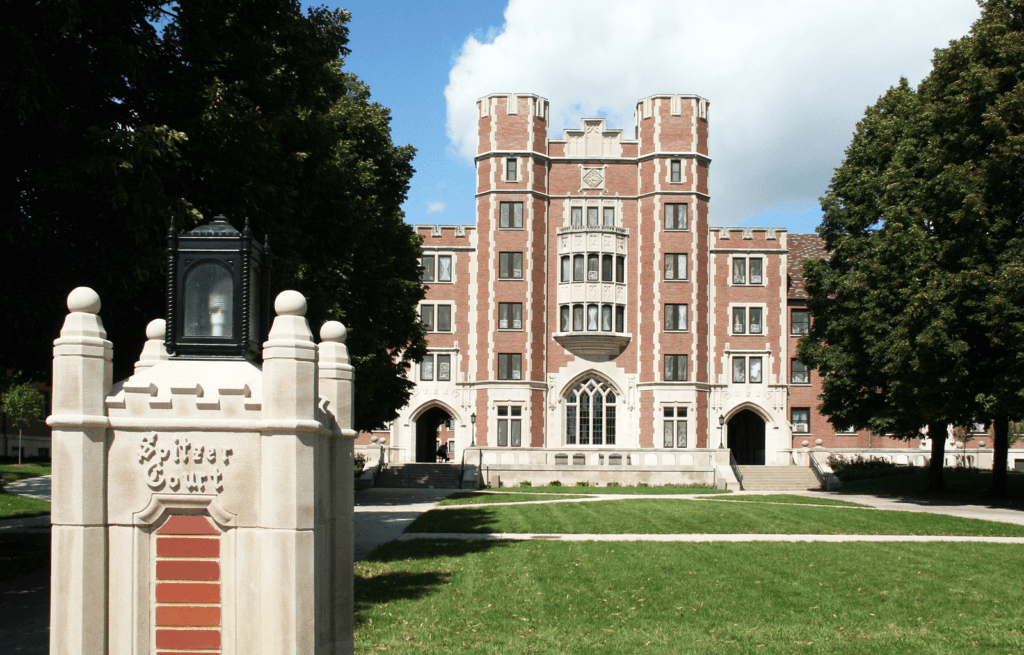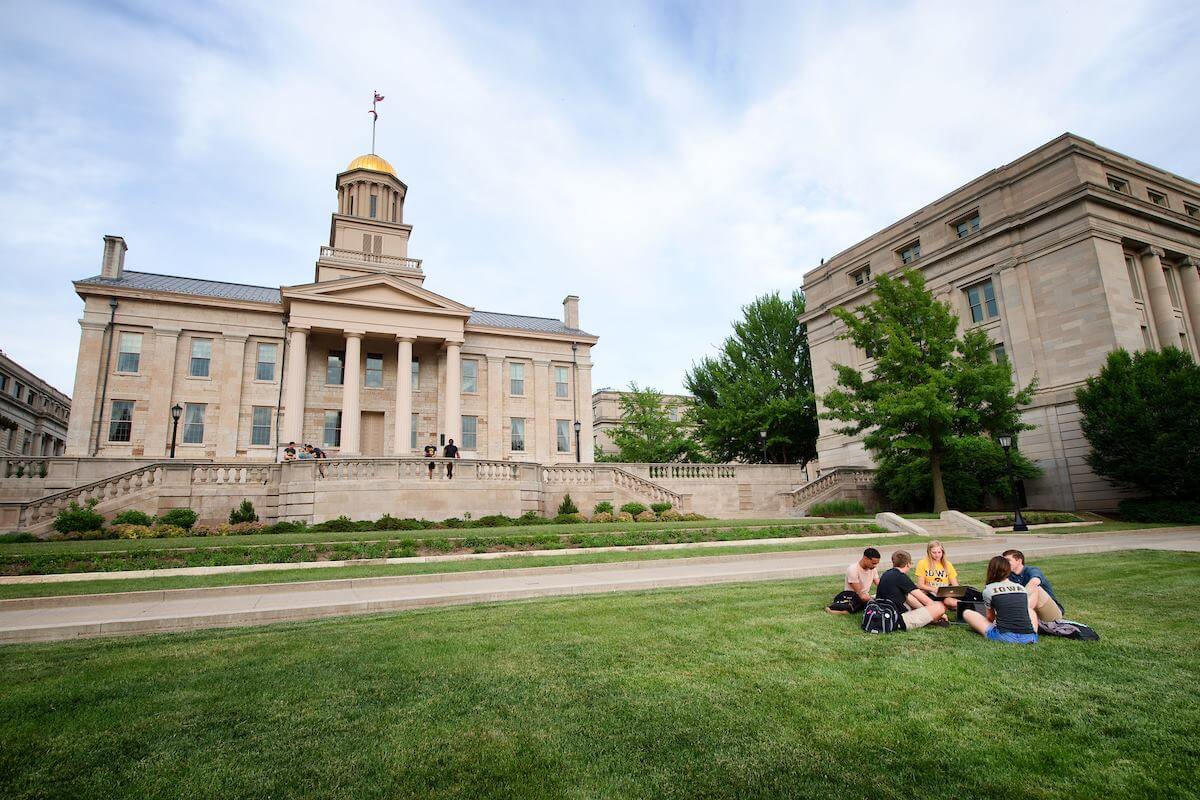Get the latest ranking of The 10 Best Colleges for English Majors 2019 here.
Any old school can give you some classic titles to read. They’ll toss in a Shakespeare course and a few papers to knock out. But only a handful of colleges can guarantee the ingredients of your English-major dreams: small class sizes, fan-girl worthy professors, a slew of courses that sound made up and award-winning, student-run literary magazines. Now, stop drooling and put your nose back in your excessively-annotated copy of Jane Eyre because we’ve done the hard work for you. These 10 schools really can satisfy the midnight cravings of any English major, even the crazy Hannah Horvaths of the world.
[woobox offer=’tuafxp’]
Literary buffs, check out the 10 best colleges for English majors.
10. Boston University
Tuition: $49,176
Financial Aid: approximate average package of $37,000-$41,000
Featured Faculty Member: Jonathan Foltz—Sydney native who joined the faculty after receiving his PhD from Princeton; has studied modernism and narrative in film
Boston University’s English department course offerings alone will leave you feeling giddy: “The Arts of Gender in Drama, Dance, Film and Theory,” “History of the Novel” (bet you never thought of this before!) and “Representing Boston.” In fact, “Representing Boston” not only covers literature written in or focused on the city of Boston, but then students take trips throughout the city. The city itself becomes your “text.” That’s right. BU students turn the town into their literary oyster. If you’ve already started planning for your future, BU offers a one-year Master of Fine Arts program in creative writing after which graduates receive a year-long global fellowship to travel and write. If travel writing isn’t on your dream list already, you might want to add it. With reading, writing and exploring, BU offers bookworms the literary trinity.
9. Emerson College

Tuition: $42,144
Financial Aid: about 65% receive it, average package is $15,000
Featured Alumni: Stacy McKee—MFA ’99; writer and co-executive producer for Grey’s Anatomy
English at Emerson is housed under the writing, literature and publishing department, and focuses on preparing its students to succeed in the real world of literary arts. Yup, your career starts here. Emerson whips your writing into shape with its staff of full-time professionals and fully-trained graduate students in their Writing Resource Center. None of that peer-tutoring nonsense. And–plot twist–students actually have a say in the department. “The student government, as well as student organizations, often meet with the Chair to discuss the state of the department,” said Professor John Skoyles, Associate Chair of the WLP Department at Emerson College. Emerson seeks to cut out the bureaucracy and red tape so you can annotate your Henry James novel in peace.
8. New York University

Tuition: $58,950
Financial Aid: $28,179 average NYU scholarship, 21% receive Pell grants
Famous Alumni: John Cusack, Martin Scorsese
NYU’s faculty directory reads like a summer-blockbuster cast list: Jonathan Safran Foer, E.L. Doctorow, Colson Whitehead and Zadie Smith are just a few of the famous writers who could be teaching you. Needless to say, students are in good hands (read: famous, Pulitzer-Prize winning, talent-leaking-out-of-every-pore hands). The English department offers a major, a minor, a creative writing minor and an accelerated masters program–a literal smorgasbord of degrees. Creative writers have the additional resource of the Lillian Vernon Creative Writing House, a private location on NYU’s campus available for readings and workshops. It’s like the “English Majors ONLY!” treehouse you never had.
Related Read: Top 10 Schools for Asipiring Writers
7. Columbia University

Tuition: $53,000
Financial Aid: average student receives $46,516 in grants, and 50% receive grants
Famous Alumni: Allen Ginsburg, Famke Janssen, Ezra Koenig, Thomas Merton, Arthur Miller
If NYC is the hive for students with an interest in English, then Columbia is the Queen Bee. Contemporary novelist Gary Shteyngart teaches at Columbia while pumping out bestsellers. There are over 20 different student publications available as creative, award-winning outlets for wordsmiths. The university’s very own Columbia Scholastic Press Association hands out awards to other schools’ publications like Tina Fey and Amy Poehler hand out Golden Globes to thirsty celebs. Because even a seasoned English major can improve her paper-writing skills, Columbia provides professional writing consultants for everyone from students to faculty. But you may not even need to leave the classroom. With a student-to-faculty ratio of six to one, you’re certain to always get the one-on-one assistance you need. Can you say “discussion-based?” You’ll never sit through a 300-person lecture class again.
6. Williams College

Tuition: $51,490
Financial Aid: average grant covers 85% of tuition
Famous Alumni: Charles Webb, author of The Graduate
Williams College took the #1 spot in U.S. News and World Report ranking of National Liberal Arts Colleges. Now, this isn’t a competition (who are we kidding, yes it is) but it’s clear that Williams’ English department probably won it. Yearly, the English department hosts a series of readings called “Lit:” that bring in modern writers like Claudia Rankin and Dean Young multiple times every semester. There’s nothing better than using a reading of your favorite authors as a guilt-free study break. The English department makes sure that every undergrad starts thinking like an English major from year one. As freshmen, every student has to write out a detailed major plan about what they’re going to do over their four years. Sounds more promising than a vision board.
5. University of Michigan

Tuition: $13,528 for in-state, $43,148 for out-of-state
Financial Aid: average award of $20,207
Featured Alumni: Sarah Lamstein—children’s book author
Take Michigan’s logo (basically a giant yellow M) and turn it sideways. That E is like the batman signal for all English majors. Its student newspaper, the Michigan Daily, is published daily during the semester. You read that right, daily. A team of undergrads support this massive undertaking, so they’re always on the hunt for grammar-versed recruits. For students looking into the future, Michigan has no shortage of opportunities in the English discipline (head nod to the Master of Fine Arts in Creative Writing and Ph.Ds in English language and literature, English and education, and English and women’s studies). For those students looking to enter the “real” world, there are some killer networking opportunities for English majors. Michigan boasts over 18,000 alumni in the major alone. That’s a whole lot of prospective employers.
4. Emory University

Tuition: $45,700
Financial Aid: average award of $38,798
Featured Faculty: Jericho Brown— associate professor; writes about poetry, LGBT studies and African-American studies in his book Please
Attention English nerds everywhere: Emory University houses the papers of Flannery O’Connor, former U.S. Poet Laureate Natasha Trethewey, Alice Walker, Seamus Heaney and Salman Rushdie. That is one star-studded laundry list, not to mention the fact that both Rushdie and Trethewey still teach at the university. The school offers a creative writing program for poetry, fiction, nonfiction, screenwriting and playwriting. Its independent student newspaper, the Emory Wheel, isn’t anything to scoff about, either. “The Wheel is truly a hub for Emory’s writers to enhance their writing skills and get published and read while doing so,” said Dustin Slade, Class of 2016 and Editor-in-Chief of the Emory Wheel. If none of that appeals to you, then why are you even here? You should probably get out of school ASAP; good thing Emory provides a 5-year bachelor’s and master’s program to get you out into the real world, quickly.
3. Purdue University

Tuition: $10,002 for in-state, $28,804 for out-of-state, $30,964 for international
Financial Aid: average package of $12,530
Featured Alumni: Rob Davidson—published two collections of short stories and a scholarly book before becoming associate professor of English at California State University
Anyone who’s ever had to write a research paper knows about Purdue University. Yes, this is the Purdue of Purdue OWL (Online Writing Lab) citations-format fame. Not only does it provide a killer online writing resource to struggling college students everywhere, but Purdue gives English students the choice of not one, but four different bachelor’s programs. Creative Writing, Professional Writing, English Literature and English Education are all available. Take your pick, bookworms. And if you’re a poet and you know it, then Purdue University has a great program called the Looseleaf Writing Workshop Series that allows staffers from their Sycamore Review and students in the writing program to teach writing workshops to the Lafayette community. The best way to spread English cheer… is to go host-writing workshops, I guess.
2. University of California Berkeley

Tuition: $13,518
Financial Aid: average award of over $16,000 (helps to cover room & board and additional costs)
Famous Alumni: Joan Didion
University of California Berkeley is a veritable breeding ground for creative talent. Home to 80+ different student publication and media groups, UC Berkeley definitely knows how to inspire English students. I mean, they have former U.S. Poet Laureate–yes, the government does still pay people to write poetry–Robert Hass on staff. If you love to write but mostly just want to learn about books, then they have a top-notch interdisciplinary creative writing program available to English students. And yes, I know you aren’t thinking about post-grad plans yet, but Berkeley’s Ph.D program in English is top-rated. Not a bad idea to get thinking about that now.
1. University of Iowa

Tuition: $21,010 for in-state, $40,796 for out-of-state
Financial Aid: $16,386
Famous Alumni: Eula Biss—prolific nonfiction author and current creative writing professor at Northwestern University
University of Iowa is no stranger to Best-Of lists, and they always seems to crop up more often than Taylor Swift’s bad Grammy’s dancing on any ranking for writers and book-lovers. They host the incredibly prestigious Iowa Writer’s Workshop, with 17 Pulitzer Prize-winning alumni to its credit. Your name could be next to Philip Roth’s one day. Swoon. In addition to a huge course selection that includes an entire class on something called the “Toni Morrison Effect,” they offer the Montpellier Exchange program that brings in faculty from France to teach classes for a year. Oui, merci–that’s all I got. While some student publications have a hard time getting students to actually read their papers rather than just use them as fancy coffee cup placemats, University of Iowa’s newspaper, the Daily Iowan, boasts a nearly 19,500 daily circulation. “We thrive on both the city and university community as our readership, and have to balance our coverage as such,” said Jordyn Reiland, Class of 2015 and Editor-in-Chief of the Daily Iowan. That’s right. Someone out there may actually read your exposé on dining hall food and care.
10 Skills English Majors Can Apply to Any Industry
Written by Phoebe Bain
Contrary to popular belief, English majors are capable of a lot more than just working at Starbucks post grad. Click through for a list of all the skills you can take from your English classes into the real world.
1. Critical Thinking

“[Being an English major at Columbia has given me] the ability to reason beyond what is presented at the surface, the skills to reflect society as it currently stands in a written medium available to anyone, and critical thinking ability that extends beyond a page and into any other area of life to deduce meaning,” Columbia University English major Sean Kelso said.
2. Professional Writing Skills

“Our students know how to write clearly and effectively. I’ve had calls from publishers and agents who wanted to formalize our relationship so they would be assured of having our students as interns—which often results in employment upon graduation. What some executives have said to me is: your students know how to write. Our department has three areas: writing, literature and publishing. So not only do our students have the background in the field through the study of literature, they learn the strategies of their art (poetry, nonfiction, fiction, etc.) and also understand the workings of the world of publishing: both book and magazine. In this way, they understand the professional side of the writing life as well as the central, literary dimension.” Emerson College English professor and English department associate chair John Skoyles said.
3. A Better Worldview

“We also offer a new seminar entitled ‘Beyond English,’ which is designed to help students translate the worth of English and the humanities to the world beyond the university; to provide them with tools to navigate a complex world; to articulate their academic achievements; and to prepare for their adult lives. By studying English … you not only learn useful professional skills, but also get a crash course in ‘adulting’ too,” Director of Purdue University English Department Undergraduate Studies Derek Andrew Pacheco said.
“I feel more knowledgeable about the world around me, because I have been exposed to so many different points of view,” University of Iowa senior Alexa Starry said.
4. Detail-Oriented Thinking

“Discussing books down to the punctuation used and where gives you the skills to think about other subjects with the same precision. I feel like noticing and caring about the small details makes you do a more thorough and effective job in any field,” University of Iowa English major Teddy Hill said.
5. Teaching Skills

“We’re dedicated to helping them transition to postgrad life. For instance, we offer an online worksite practicum that students can take for credit while pursuing that all-important internship, as well as a teaching writing practicum for students interested in tutoring experience with our world-renowned Writing Lab. If there’s one thing that companies like better than employees who can write, it’s employees who can teach other employees to write,” Pacheco said.
6. Internship Experience

“The department also offers in-house internships that introduce students to the worlds of scholarly and literary publishing, as well as teaching, academic research and community engagement. We’re also working with corporate partners to connect our students with summer internships in Chicago and Indianapolis (West Lafayette is nestled cozily between these two cities). These opportunities help reassure students that they are making the right choice in majoring in English at Purdue, offering them valuable work and life experience along with their first-rate education,” Pacheco said.
“I was able to take part in a job shadow with an independent poetry press called Black Ocean,” Starry said.
7. Networking Opportunities

“There seems to be an understanding between English majors of what you have to go through to get your degree; for example, there’s generally a common loathing of the ‘Foundations of the English Major’ class everyone has to take. One thing that surprised me, though, is how encouraging and helpful people in my major really are. I honestly expected some of my classes, especially creative writing workshops, to be at least a little cutthroat and competitive, but the reality is we all desire to see each other succeed … I was able to meet Roxane Gay (author of Bad Feminist, Difficult Women and Hunger: A Memoir of my Body). Wonderful opportunities such as these allow English majors to really hone the skills we learn in class,” Starry said.
8. Resilience

“Resilience is a major skill I will take away from my years as an English major at Iowa. I’ve learned that if a teacher or another student critiques your writing, you need to listen to them, because they want to help you improve and be the best you can be,” Starry said.
9. Creative Intentions

“Leaving the University of Iowa has also left me with a strong desire to create, and, on top of that, being an English major has helped to develop my imagination and love for literature,” Starry said.
10. All Around Awesomeness

“The study of English has been shown not only to improve critical thinking, reading and writing, but also emotional intelligence and perspective-taking. It encourages curiosity about other times, places and people, as well as the ability to imagine alternatives to the status quo. Believe it or not, deep reading and writing also help reduce stress, improve brain functioning and elasticity and enhance memory, concentration and pattern recognition and more. As you might imagine, storytelling is something we’re really good at too, and there is no hotter buzzword in the business world now. To tell a story effectively—whether to find a job or to sell a product—you need to first study (and write) stories. Finally, English is just plain fun. Books are awesome,” Pacheco said.
[woobox offer=’tor6do’]
Show off your love of reading…and puns:
Get more articles for English majors:
CM’s Guide to the English Major
10 Talents You’ll Gain as an English Major
How to Peer Edit Without Losing Friends
25 Questions English Majors are Tired of Answering
How to Be an Employed English Major: A Resume Guide
For more college rankings, check out:
Top 10 Most Beautiful Campuses
10 Best Dining Halls on College Campuses
CM’s 10 Most Stressful Colleges
*Updated on June 3, 2015 to replace University of Iowa photo with the correct campus.
**Updated on June 10, 2015 to replace English Composition with English Literature at Purdue.
***Updated on June 7, 2016 with new information from Meghan Gresk for each school.
****Updated on July 21, 2016 with an opportunity to save on books.
*****Updated on February 16, 2018 to include “10 Skills English Majors Can Apply to Any Industry” by Phoebe Bain




















